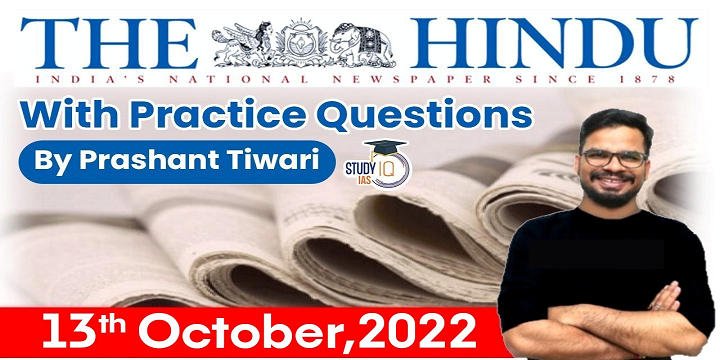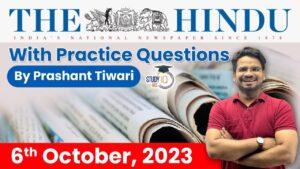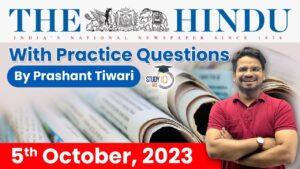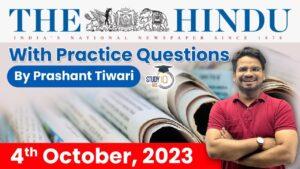The Hindu Newspaper Analysis for UPSC

The Hindu Newspaper Analysis 12 October 2022
- Retail inflation accelerated to a five-month high of 7.41% in September, from 7% in August, as food inflation surged sharply to 8.41% last month — the steepest level in 22 months.
- September’s retail inflation was the highest since April, when price rise quickened to an almost eight-year high of 7.79%, and economists warned that the latest negative surprise could force the Reserve Bank of India (RBI) to opt for further interest rate increases beyond the widely expected 0.5 percentage point increase in the December monetary policy.
- Inflation in cereals quickened to 11.5%, with rural India facing almost 12% price gains, up sharply from 9.6% in August and almost doubling from July’s 6.9% pace. Similarly, vegetables’ inflation almost virtually doubled over two months, from 10.9% in July to 18.1% in September, with urban consumers facing a sharper 20.1% rise.



- Union Home Minister Amit Shah will launch the Hindi versions of first-year MBBS textbooks in Bhopal on October 16. With this, Madhya Pradesh will inch closer to becoming the first State to provide medical education in Hindi.

- In a first in the country, the Tamil Nadu government on Wednesday notified the Kaduvur slender loris sanctuary covering 11,806 hectares in Karur and Dindigul districts.
- Slender lorises, which are small nocturnal mammals, are arboreal as they spend most of their life on trees.
- The species acts as a biological predator of pests in agricultural crops and benefits farmers.
- Listed as an endangered species by the International Union for Conservation of Nature, slender loris has a wide range of ecological roles in the terrestrial ecosystem.

- The meeting on September 30 is not held because Justice D.Y. Chandrachud, the seniormost puisne judge and in line to be the next CJI, sits in court till 9.30 p.m.
- Since the meeting cannot be held as scheduled, the CJI tries to obtain approval by circulation.
- Two judges accord approval but Justice Chandrachud and Justice Nazeer withhold approval. Apparently they do not object to the names but object to the procedure of circulation.
- Time and again, it has been widely commented that this is an extra-constitutional or non-constitutional body brought in force by judgments of the Supreme Court virtually wresting the power of appointment of judges.
- The Constitution of India gave the last word to the President of India but mandated consultation with the Court. These judgments give the last word to the Court mandating consultation with the government.
- While doing so, we may also ask why there have been no appointments from the category of distinguished jurists which Article 124 of the Constitution contemplates.

- India’s wholesale inflation rate has been declining since July this year but has remained in double digits since April 2021. Last month, the inflation rate was recorded at 12.41%, from 13.93% in July.
- Consistently high inflation leads to people deferring purchases, purchasing less, going in for reuse and recycling, or just switching to cheaper alternatives.
- The search for cheaper alternatives kicks up a storm — markets are flooded with cheap inferior goods or spurious and fake brands, giving a dream run to the parallel economy players.
- This is where the China angle comes in. The parallel economy dealers need access to seemingly similar functioning cheaper goods which are aptly served by factories humming in China.
- The consumer’s search for cheaper alternatives gives birth to another menace which hurts even more — a booming, smuggled and illegal goods market.
- This includes mobile phones, fast-moving consumer goods (FMCG) – household and personal goods, FMCG-packaged foods, tobacco products, and alcoholic beverages.
- According to a report by the Economist Intelligence Unit, in 2018 India ranked low in the Global Illicit Trade Environment Index and needed quantifiable actions to bring down the risks of illicit trade on the economy.

- The International Monetary Fund (IMF), in its latest World Economic Outlook report, has retained global growth hopes for 2022 at 3.2%, and lowered next year’s projection to 2.7% from 2.9%.
- The year 2023 will feel like a recession for many people in the world, the Fund has cautioned, as ‘the worst is yet to come’ amid tighter monetary policies to curb stubbornly high inflation and a spiralling energy and food crisis.
- While it retained India’s 2023-24 growth estimate at 6.1%, the IMF slashed this year’s forecast to 6.8%, from 7.4% in July.
- This is the second significant estimate after the World Bank’s 6.5% assessment that pegs India’s GDP rise below 7%, which the Reserve Bank of India and North Block mandarins are expecting this year.


- In September, a study published in the journal Science said earth may have already passed through five dangerous tipping points due to the 1.1°C of global heating caused by humanity to date.
- Calls for developing and transferring technologies to support action on climate change have become louder worldwide.
- COP26 at Glasgow also fuelled technological optimism. There was an observation that every technological solution discussed at COP26 depends on just three resources: nelectricity (non-emitting electricity generated by hydropower, renewables or nuclear fission), carbon capture and storage (CCS) or biomass.
- Tech-centric mitigation conversations leave forest economies and subjects such as conservation and forests, which are the best carbon removal instruments, to the ideological fringes of climate conversation. Climate action requires the same amount of investment in conservation as we see in shiny new technology transfers.
- We need to realise that the climate crisis is just a symptom; our real problem is that human consumption and activity have exceeded the regenerative capacity of our planet. Technology, at best, can assist us, not lead us, on the pathway to a sustainable, regenerative and equitable world.
- UNFCCC:
The United Nations Framework Convention on Climate Change (UNFCCC), signed in 1992 at the United Nations Conference on Environment and Development also known as the Earth Summit, the Rio Summit or the Rio Conference. - The UNFCCC entered into force on 21stMarch 1994, and has been ratified by 197 countries.
- It is the parent treaty of the 2015 Paris Agreement. It is also the parent treaty of the 1997 Kyoto Protocol.
- The UNFCCC secretariat (UN Climate Change) is the United Nations entity tasked with supporting the global response to the threat of climate change. It is located in Bonn, Germany.
- The Conference of the Parties (COP):
COP is the apex decision-making authority of UNFCCC. - The COP meets every year, unless the Parties decide otherwise. The first COP meeting was held in Berlin, Germany in March, 1995.

- A Constitution Bench on Wednesday questioned whether the government and the Reserve Bank of India (RBI) realised their stated objectives of choking black money, terror financing and fake currency through the policy to demonetise ₹500 and ₹1,000 notes in 2016.
- The court’s question came despite the government urging the Bench not to “waste” judicial time on the issue. Attorney-General R. Venkataramani termed the case “academic” in nature as things had long settled.
- Demonetisation in 1946 and 1978 were implemented through separate Acts debated by Parliament. In 2016, it was done through a mere notification issued under provisions of the Reserve Bank of India Act, 1934.

- The Supreme Court on Wednesday ordered States and their police forces to stop prosecuting free speech on social media under Section 66A of the Information Technology Act which was declared unconstitutional by the court in a judgment seven years ago.
- The court found it both “distressing” and “terrible” that the police had continued to pick out people and prosecute them under the draconian Section regardless of the fact that the highest court in the country had struck down the law as “vague” and “chilling”.
About Section 66A of IT Act
- Shreya Singhal v. Union of India:
- In 2015, the apex court struck down the law in the landmark case Shreya Singhal v. Union of India, calling it open-ended and unconstitutionally vague, and thus expanded the contours of free speech to the Internet.
- It was violative of Article 19(1) (a) and not saved under Article 19(2).
- Article 19(1) (a) gives people the right to speech and expression whereas 19(2) gives the state the power to impose “reasonable restrictions” on the exercise of this right.
- What did Section 66A do?
- Introduced in 2008, the amendments to the IT Act, 2000, gave the government power to arrest and imprison an individual for allegedly “offensive and menacing” online posts.
- Punishment:
- It prescribed the punishment for sending messages through a computer or any other communication device like a mobile phone or a tablet, and a conviction could fetch a maximum of three years in jail.
- In 2015, the apex court struck down the law in the landmark case Shreya Singhal v. Union of India, calling it open-ended and unconstitutionally vague, and thus expanded the contours of free speech to the Internet.



- The Biden administration has said that maintaining a competitive edge over China and constraining Russia are priorities for the U.S. strategy, as it released the administration’s first National Security Strategy on Wednesday.
- The document — which every administration is required to release, by law — was delayed due to Russia’s invasion of Ukraine. It lists great power competition and transnational challenges as the two premises on which the strategy is built.
Q) World Economic Outlook report is released by?
- World Bank
- IMF
- WEF
- OECD
विश्व आर्थिक आउटलुक रिपोर्ट किसके द्वारा जारी की जाती है?
- विश्व बैंक
- अंतर्राष्ट्रीय मुद्रा कोष
- विश्व आर्थिक मंच
- ओईसीडी
- The world, including India, will experience an overall slowdown in the next year owing to the impact of the Russia-Ukraine war, tightening monetary conditions globally, the highest inflation in decades, and lingering effects of the pandemic, according to the International Monetary Fund.
- India is projected to grow at 6.8% in the current fiscal year, following 8.7% growth in fiscal year that ended March 31 as per figures released in the IMF’s October 2022 World Economic Outlook: Countering the Cost-of-Living Crisis at the start of the World Bank IMF Annual Meetings here.
Q) Consider the following statement regarding Central Information Commission:
- It is non constitutional body.
- The Commission consists of a Chief Information Commissioner and not more than ten Information Commissioners.
Which of the above statements is/are correct?
- 1 only
- 2 only
- Both 1 and 2
- Neither 1 nor 2
केंद्रीय सूचना आयोग के संबंध में निम्नलिखित कथनों पर विचार करें:
- यह असंवैधानिक निकाय है।
- आयोग में एक मुख्य सूचना आयुक्त होता है और दस से अधिक सूचना आयुक्त नहीं होते हैं।
उपरोक्त में से कौन सा/से कथन सही है/हैं?
- केवल 1
- केवल 2
- दोनों 1 और 2
- न तो 1 और न ही 2
- Central Information Commission: Established by the Central Government in 2005, under the provisions of the Right to Information Act (2005).
- Members: The Commission consists of a Chief Information Commissioner and not more than ten Information Commissioners.
- Appointment: They are appointed by the President on the recommendation of a committee consisting of the Prime Minister as Chairperson, the leader of the single largest Opposition party in the Lok Sabha and a Union Cabinet Minister nominated by the Prime Minister.
- Tenure: The Chief Information Commissioner and an Information Commissioner shall hold office for such term as prescribed by the Central Government or until they attain the age of 65 years, whichever is earlier.
- They are not eligible for reappointment.
Q) Consider following statements:
- Justice D.Y Chandrachud will be 49th CJI.
- Justice Y.V.Chandrachud was the Justice with the longest tenure as the CJI of India.
Which of the above statements is/are correct?
- 1 only
- 2 only
- Both 1 and 2
- Neither 1 nor 2
निम्नलिखित कथनों पर विचार करें:
- जस्टिस डी वाई चंद्रचूड़ 49वें CJI होंगे।
- न्यायमूर्ति वाई.वी.चंद्रचूड़ भारत के मुख्य न्यायाधीश के रूप में सबसे लंबे कार्यकाल वाले न्यायाधीश थे।
उपरोक्त में से कौन सा/से कथन सही है/हैं?
- केवल 1
- केवल 2
- दोनों 1 और 2
- न तो 1 और न ही 2
- Chief Justice Lalit’s recommendation to the government would start the process for appointment of Justice Chandrachud as the 50th Chief Justice of India.
- If the government approval comes through, Justice Chandrachud would be the first second-generation CJI. His father, Justice Y.V. Chandrachud, was the 16th CJI and one of the longest serving.
- Chief Justice Lalit is scheduled to retire on November 8 at the end of a 74-day tenure as top judge. Justice Chandrachud is expected to be sworn in and assume charge as Chief Justice of India from November 9. He has a tenure of two years as Chief Justice until his retirement on November 11, 2024.
- Justice Y.V.Chandrachud was the Justice with the longest tenure as the CJI of India. He served as a CJI of India for around 7 years between 1978 to 1985.
Q) Which of the following country is not included in G7:
- India
- Canada
- France
- South Africa
Which of the above statements is/are correct?
- 1 and 2 only
- 2 and 3 only
- 1 and 4 only
- 3 and 4 Only
निम्नलिखित में से कौन सा देश G7 में शामिल नहीं है:
- भारत
- कनाडा
- फ्रांस
- दक्षिण अफ्रीका
उपरोक्त में से कौन सा/से कथन सही है/हैं?
- केवल 1 और 2
- केवल 2 और 3
- केवल 1 और 4
- केवल 3 और 4
- Ukrainian President Volodymyr Zelensky appealed to leaders of the Group of Seven nations on Tuesday for more air defence capabilities and the G7 vowed to support Kyiv for “as long as it takes” while warning Russia against any use of nuclear weapons.
- The G7 — which groups the United States, Germany, France, Japan, Britain, Italy and Canada — pledged continued “financial, humanitarian, military, diplomatic and legal support… for as long as it takes” to Ukraine, it said in a statement.
Q) Consider the following statement regarding Beti Bachao Beti Padhao Scheme:
- It was launched in January 2022.
- This is a joint initiative of the Ministry of Women and Child Development, Ministry of Health and Family Welfare and Ministry of Finance.
Which of the above statements is/are correct?
- 1 only
- 2 only
- Both 1 and 2
- Neither 1 nor 2
बेटी बचाओ बेटी पढाओ योजना के संबंध में निम्नलिखित कथनों पर विचार करें:
- इसे जनवरी 2022 में लॉन्च किया गया था।
- यह महिला एवं बाल विकास मंत्रालय, स्वास्थ्य और परिवार कल्याण मंत्रालय और वित्त मंत्रालय की संयुक्त पहल है।
उपरोक्त में से कौन सा/से कथन सही है/हैं?
- केवल 1
- केवल 2
- दोनों 1 और 2
- न तो 1 और न ही 2
What is BBBP?
- It was launched in January 2015 with the aim to address sex selective abortion and the declining child sex ratio which was at 918 girls for every 1,000 boys in 2011.
- This is a joint initiative of the Ministry of Women and Child Development, Ministry of Health and Family Welfare and Ministry of Education.
- The programme is being implemented across 405 districts in the country.
- Main Objectives:
-
- Prevention of gender-biased sex-selective elimination.
- Ensuring survival & protection of the girl child.
- Ensuring education and participation of the girl child.
- Protecting rights of Girl children.
Mains Practice Question:
Q) “The role of media as a watchdog in a democracy”. Explain. (150 words)
“लोकतंत्र में एक प्रहरी के रूप में मीडिया की भूमिका”। समझाना। (150 शब्द)
Introduction:
- Media is considered the “Fourth Pillar” in democratic countries along with Legislature, Executive, and Judiciary. Its importance in influencing readers can be gauged by the role it played during the freedom struggle, politically educating millions of Indians who joined the leaders in their fight against British imperialism.
Body:
- Media acts as a watchdog of public interest in a democracy. It plays an important role in a democracy and serves as an agency of the people to inform them of the events of national and international significance.
- It is the means by which people receive a free flow of information and ideas, which is essential to intelligent self-governance, that is, democracy.
- Freedom of the media is part of the freedom of speech guaranteed by the Constitution under Article 19 (1) (a).
- One of the basic tasks of the media is to provide truthful and objective information to the people for their social, political and international awareness to reach an informed opinion.
- This makes the media an important stakeholder in a democracy to shoulder the responsibility of presenting unbiased honest news without any vested interest.
- The absence of objective journalism leads to the false presentation of truth in a society which affects the perception and opinions of people. As observed in the Cambridge Analytica case, the biased news coverage on social media platforms affected the Presidential elections in the U.S.
Conclusion:
- In developing countries like India, the media have a great responsibility to fight backward ideas such as casteism and communalism and help the people in their struggle against poverty and other social evils.
- Hence, having journalistic ethics in place becomes very important. It is important that the media stick to the core principles like truth and accuracy, transparency, independence, fairness and impartiality, responsibility and fair play.
Mains Practice Question:
Q) Mental health is one of the most neglected social issues in India. Explain (150 words)
मानसिक स्वास्थ्य भारत में सबसे अधिक उपेक्षित सामाजिक मुद्दों में से एक है। समझाएं (150 शब्द)


 The Hindu Newspaper Analysis 6 October 2...
The Hindu Newspaper Analysis 6 October 2...
 The Hindu Newspaper Analysis 5 October 2...
The Hindu Newspaper Analysis 5 October 2...
 The Hindu Newspaper Analysis 4 October 2...
The Hindu Newspaper Analysis 4 October 2...



















